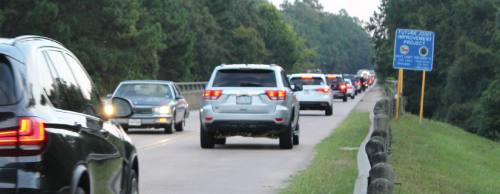Harris County plans to accommodate growth, alleviate congestion and fund amenities through four bond proposals in the upcoming Nov. 3 election. The bonds total $848 million with the largest proposition providing $700 million for road projects.
 “If [the bond] doesn’t pass, we’ll continue to build at the rate we’re building,” county engineer John Blount said. “But the people continue to move here. [Congestion is] just going to continue to get worse and worse.”
“If [the bond] doesn’t pass, we’ll continue to build at the rate we’re building,” county engineer John Blount said. “But the people continue to move here. [Congestion is] just going to continue to get worse and worse.”
Blount said the unincorporated population of Harris County rose 74 percent from 2000-14, but total county road miles increased by only 40 percent in that time.
Other bond referendums proposed by the county include $60 million for parks, $64 million for Harris County Flood Control District projects and $24 million to build a new Harris County animal shelter.
Mobility money
The vast majority of the $700 million proposed by the road bond referendum, or $640 million, will be allocated to major road and bridge projects and expansions, county officials said.
Precinct 4, which includes all of Spring and Klein, would receive 30 percent of the transportation funding based on the county’s current formula and precinct boundaries, Harris County Budget Officer Bill Jackson said. However, Blount said Harris County does not provide a list of specific road projects prior to bond elections.
“If we were to list every road on a bond referendum, the voters would have to read through 200 pages because the law says if you vote and you specifically [list the projects], that’s all you can use [the bond money] for,” Blount said.
Precinct 4 Commissioner Jack Cagle said there are several major projects within his precinct that could be funded through bond money. The projects include bridge expansions of Gosling and Kuykendahl roads over Spring Creek, the extension of Louetta Road from Blanco Trails Lane to Telge Road and the widening of sections of North Eldridge Parkway and Telge Road.
The road projects are necessary to accommodate rapid growth in Precinct 4, Cagle said. The growth has been so significant, county demographers have underestimated the use of some county roadways, he said. The Tomball Tollway, which opened in April, was expected to see 18,000 cars per day, but estimates show as many as 30,000 cars per day are traversing the toll road.
“We can take that experience to indicate that our growth is like that in the rest of the county and especially within our precinct,” Cagle said.
The $640 million will also be used to make traffic more efficient through the construction of left-hand turn lanes, new traffic signals and fiber optical network connections that will help synchronize traffic lights, Blount said.
The remaining $60 million proposed in the bond package would help fund maintenance and improvements to aging infrastructure in older neighborhoods. Blount said there are subdivisions within the county that were built in the ’50s, ’60s and ’70s with roads that had a 30-year design life.
“The assumption that everybody went on forever until the last [few] years was that the city of Houston would continue to annex these [aging subdivisions],” Blount said. “Traditionally they’ve done that, but they’ve pretty much stopped annexing. So these roads are continuing to age, and that’s why we’ve got to put money into them.”
Many of the subdivisions built along FM 1960 in Precinct 4 could use maintenance work, including those in the Champions area, Blount said. Cagle said he would meet with municipal utility districts and homeowners associations to determine which roads are most in need of repair.
“They are not projects that would normally get onto our lists because they are not unsafe yet, nor are they mobility issues,” Cagle said. “But if we don’t get to them, they will become one of those. So that’s a very positive feature of this bond.”
Conservative approach
The county’s property tax rate will not increase if voters approve the bond proposals, Harris County officials said. Jackson said the $848 million in bonds would be issued over the next seven to 10 years beginning in fiscal year 2016-17, but the county plans to pay off $1.248 billion in debt by fiscal year 2022-23.
Even if property tax revenue—which has risen about 6.1 percent per year from 2005-14—does not rise, county officials said the additional debt would not require a tax rate increase.
[polldaddy poll=9115562]
“If something dramatic happens over the next 10 years with the Houston economy, we wouldn’t have to build those roads,” Jackson said. “We’re in really good shape [financially right now].”
Although the bonds would benefit Precinct 4, Cagle said the proposed funding over the next several years will not fund all of the major road improvements needed across the precinct.
“In [Harris] County, we tend to approach things very conservatively,” Cagle said. “We easily could put into the ground a budget of double that. I know in my precinct there are tons of projects we could [construct], but to do that would require us to not live within the current tax means.”
Jon Lindsay, president of the North Houston Association and former Harris County judge from 1975-95, said Harris County is one of the few counties in the country that does not have an ad valorem property tax to fund road and bridge maintenance.
The county instead transfers $120 million from toll revenue every year to the mobility fund to pay for road projects, county officials said.
“That’s not fair to the toll road users,” Lindsay said. “I think if people would go ahead and vote for the bond proposal, you’d have to pay those bonds back with ad valorem tax. Therefore, all the $700 million spent on new roads would be a fair tax.”
However, county officials said the county does pay back debt on road bonds with the debt service portion of the property tax rate.
The Harris County Democratic and Republican parties said they do not plan to take stances on the bond proposals.
Parks, flood control
The county is also seeking voter approval to issue $60 million for park bonds and $64 million in bonds to fund Harris County Flood Control District projects.
Blount and Cagle said the county works with the HCFCD during construction projects to help improve detention and reduce flooding for property owners nearby and downstream through detention ponds and other flood mitigation efforts.
Funding for the flood control projects would not be split between precincts, Jackson said. However, the park funding will be split evenly with each precinct receiving $15 million to fund parks and trail projects.
Park projects that could receive bond money in Precinct 4 include improvements to the undeveloped Kickerillo-Mischer Preserve in The Vintage as well as land acquisition and trails along greenways on Spring and Cypress creeks, county officials said.
Cagle said there are also several neighborhoods in need of sports fields, playgrounds and park upgrades. He said parks provide more value to the community than just offering an outdoor venue for families.
“Whenever we put in a park amenity in the community, it improves the value of that neighborhood and enhances the quality of life,” Cagle said.






